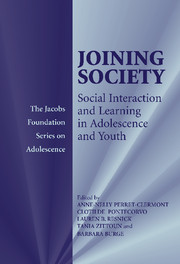Book contents
- Frontmatter
- Contents
- List of Contributors
- Foreword
- Preface
- I Introduction
- II Youth-Constructed Socialization
- 4 Risks, Rules, and Roles: Youth Perspectives on the Work of Learning for Community Development
- 5 Youth Between Integration and Disaffiliation in French Cities
- 6 A New Identity, A New Lifestyle
- 7 Becoming a Member by Following the Rules
- III Personal Agency Through Collective Activity
- IV Learning in Practice and Discourse
- V Intergenerational Sites for Thinking
- VI Pathways to Adulthood in National Context
- Index
- References
5 - Youth Between Integration and Disaffiliation in French Cities
Published online by Cambridge University Press: 08 January 2010
- Frontmatter
- Contents
- List of Contributors
- Foreword
- Preface
- I Introduction
- II Youth-Constructed Socialization
- 4 Risks, Rules, and Roles: Youth Perspectives on the Work of Learning for Community Development
- 5 Youth Between Integration and Disaffiliation in French Cities
- 6 A New Identity, A New Lifestyle
- 7 Becoming a Member by Following the Rules
- III Personal Agency Through Collective Activity
- IV Learning in Practice and Discourse
- V Intergenerational Sites for Thinking
- VI Pathways to Adulthood in National Context
- Index
- References
Summary
Contrary to accepted ideas, young people are not always passive in the face of risk and unemployment, nor are they merely the sum of their previous familial, educational, and social trajectories. Rather, they are coauthors of their own socialization, endowed with a capacity for interpretation and an ability to invent social roles, even in situations of constraint and great risk. Of course, when situations become intolerable, individuals' capacity for action diminishes almost to the vanishing point. At the same time, however, the socialization of young people is still a continuous and dynamic process that moves forward through a series of alterations, readjustments, and identity conflicts among those young people and the groups to which they belong. According to Becker and McCall (1990), “Nothing is fully determined. At every step of every unfolding event, something else might happen. To be sure, the balance of constraints and opportunities available to the actors, individual and collective, in a situation will lead many, perhaps most of them to do the same thing” (p. 6).
In the course of various research projects carried out in France since 1983, we have observed that, in socially vulnerable areas, interstitial spaces emerge between labor markets at the center and on the periphery of cities, where unemployment and employment alternate and are superimposed on one another. We call such spaces intermediate spaces in which cultures of uncertainty are produced (Roulleau-Berger, 1991).
- Type
- Chapter
- Information
- Joining SocietySocial Interaction and Learning in Adolescence and Youth, pp. 71 - 85Publisher: Cambridge University PressPrint publication year: 2003

